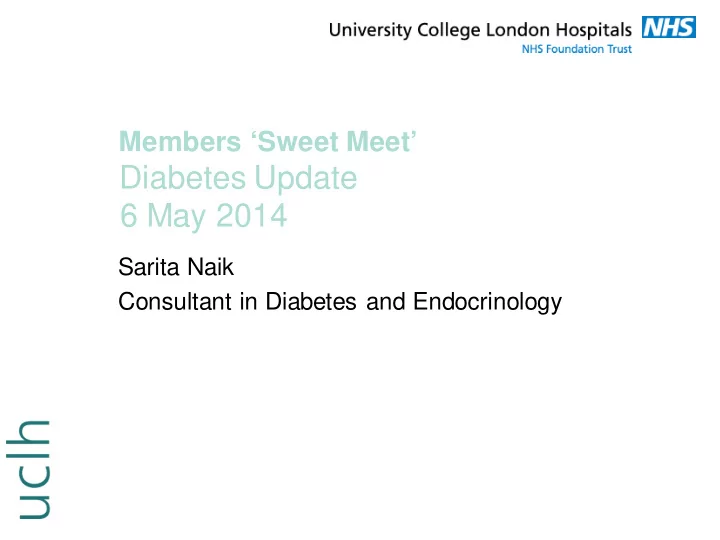

Members ‘Sweet Meet’ Diabetes Update 6 May 2014 Sarita Naik Consultant in Diabetes and Endocrinology
Some of the myths…. People with diabetes can’t lead Should you normal lives be having that cake? People with diabetes will Type 1 eventually is worse go blind than Eating sugar type 2 gives you diabetes People with diabetes I have mild need to eat diabetes diabetic foods
How many people have diabetes? Globally 366 million (double over next 20 years) UK 4.45% 2.9 million people 850, 000 undiagnosed 10% type 1 90% type 2
What does the pancreas do? Insulin Glucagon Digestives enzymes
How is glucose regulated in the body? Glucose taken up into cells to be Insulin burnt as fuel released Glucose level goes up ( carbohydrate /liver) Glucose Brain level falls needs Glucagon Insulin fuel / release adrenalin stopped e stimulate s glucose release
But… Weight gain Genetics Environmental triggers Pancreatic damage/surgery Pancreas affected
What is type 1 diabetes? Autoimmune – antibodies destroy the pancreatic cells producing insulin/glucagon Dependent on insulin treatment to control blood glucose levels Younger age
What is type 2 diabetes? Insulin resistance Associated with weight gain Fat cells release chemicals that increase insulin resistance Pancreas compensates and releases more insulin to control blood glucose
What are the risks for type 2 diabetes? Over age 40 (25 South Asian) Close family member with diabetes Overweight with a large waist size (over 31.5 inches for women/37 inches for men) Medication – steroids, antipsychotics Pre-diabetes
What are the complications of diabetes?
Heart Disease Eye Disease Stroke Kidney - leaking Erectile dysfunction protein Diabetic Peripheral Nerve Arterial Damage Disease - Pain - numbnes s
But the good news is.. Complications progress slowly Screen – identify early Improving glucose control – delay or prevent progression NINE CARE PROCESSES
Nine care processes HbA1c – measure of diabetes control 1. Urine ACR 2. Cholesterol 3. Kidney function 4. Feet – pulses, sensation 5. Blood Pressure 6. Retinal Screening 7. Weight 8. Smoking 9.
Blood Retinal Pressure Screening Cholesterol Smoking HBA1 Creatinine (blood test) c Urine ACR Foot exam Foot exam - Sensation - pulses
Diabetes control HbA1c – measure of glucose levels over 2-3months Type 2 Oral medications Injectable treatment Insulin Type 1 insulin
Discovery of Insulin – Banting and Best (and Marjorie)
Leonard Thompson – first patient to receive insulin treatment (1920s)
1960s
1980s
Mid 1980s
What are the barriers to good diabetes control?
Barrier 1: Hypoglycaemia Blood glucose level < 3.5
Hypoglycaemia
Frightening, loss of control Recurrent hypos Body adjusts Blunted hormone response Lose awareness of hypos Severe hypos – conscious levels impaired, needing assistance, fits
What is the second barrier?
Elliot P Joslin
Self-management Joslin considered to be father of ‘self-management’ Informed, good diabetes education Be able to make choices about medication Plan your care in collaboration
DAFNE Education programme (type 1 diabetes) Carbohydrate counting (matching insulin dose to carbohydrate) Peer support
Psychological Support
But can newer treatments help with hypoglycaemia and self-management?
CONTINUOUS 1990s onwards.. GLUCOSE SENSOR INSULIN PUMP
Insulin pump therapy Delivers insulin continuously Adjust rate that insulin is delivered Flexibility
Closed loop / artificial pancreas
Transplants Whole pancreas Islet cells
Islet cell transplants
Islet cell transplants Seven centres in the UK Insulin independence rate of 25% at 5 years Reduction in severe hypoglycaemia Anti-rejection medication Excess risk of cancer infection
But what about type 2 diabetes?
Diabetes Practice Education nurse for annual Podiatrist review Hunter St Hospital podiatry Community diabetes Sees GP specialist nurses for insulin Stays in hospital clinic DSN thinks BOB victoza would be 52 yrs better Worried about Sends back weight to GP Referred to dietitian Retinal screen at local Drummond Street walk-in GP refers centre to hospital DSN Annual Seen in hospital review hospital
What are the current problems? Missing out on nine care processes Duplication System difficult to navigate Multiple visits to different healthcare professionals Mixed messages
Integrated system Patient centred No duplication All patients receiving 9 care processes Appropriate healthcare professional at the right time
Camden Camden CCG Camden Community Diabetes Royal Free Islington Islington CCG Islington Community Diabetes Nurses Whittington Value based commissioning Commission services Best outcomes for patients efficient
What does that mean for staff? GPs and practice nurses Receive better education Practice visits from diabetes consultants Same message Multi-disciplinary team meetings Include social, mental health support Better communication between all HCP Closer working with community diabetes team
What does that mean for you? Flexible education programmes Good diabetes care from your GP/community nurses Quick access to hospital services if you need them
Better diabetes control Better self-management skills Less complications Better quality of life
To summarise: Diabetes is increasing Diabetes Type 1 and type 2 Associated with significant complications Complications of treatment eg hypoglycaemia Integrated care is the best care
Thank you for listening. Any questions?
Recommend
More recommend